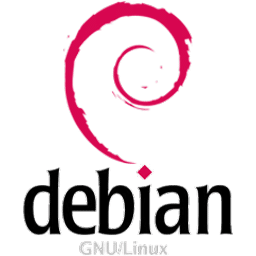Debian 13.3 ‘Trixie’/ 12.13 ‘Bookworm’

Debian is a free operating system (OS) for your computer. An operating system is the set of basic programs and utilities that make your computer run. Debian uses the Linux kernel (the core of an operating system), but most of the basic OS tools come from the GNU project; hence the name GNU/Linux.
Linux is a piece of software started by Linus Torvalds and supported by thousands of programmers worldwide. However, work is in progress to provide Debian for other kernels, primarily for the Hurd. The Hurd is a collection of servers that run on top of a microkernel (such as Mach) to implement different features. The Hurd is free software produced by the GNU project.
A large part of the basic tools that fill out the operating system come from the GNU project; hence the names: GNU/Linux and GNU/Hurd. These tools are also free. Of course, the thing that people want is application software: programs to help them get what they want to do done, from editing documents to running a business to playing games to writing more software. Debian comes with over 29000 packages (precompiled software that is bundled up in a nice format for easy installation on your machine) – all of it free.
This operating system runs on computers ranging from palmtops and handheld systems to supercomputers, and on nearly everything in between. It support twelve architectures: Sun SPARC (sparc), HP Alpha (alpha), Motorola/IBM PowerPC (powerpc), Intel IA-32 (i386), IA-64 (ia64), HP PA-RISC (hppa), MIPS (mips, mipsel), ARM (arm, armel), IBM S/390 (s390), and AMD64 and Intel EM64T (amd64).
Debian GNU/Linux provides more than a pure OS:
it comes with over 29000 packages, precompiled software bundled up in a nice format for easy installation on your machine. Debian systems currently use the Linux kernel.
The availability and updates of OpenJDK, GNU Java compiler, GNU Java bytecode interpreter, Classpath and other free versions of Java technology, into Debian GNU/Linux allow us to ship Java-based applications in Debian’s main repository.
For non-native English speaking users the package management systems now support translated package descriptions. It will automatically show the description of a package in the native language of the user, if available.
You can install Debian GNU/Linux from various installation media such as DVDs, CDs, USB sticks and floppies, or from the network. GNOME is the default desktop environment and it is on the first CD. Other desktop environments – KDE, Xfce, or LXDE – you can install through two new alternative CD images. Again available with Debian GNU/Linux are multi-arch CDs and DVDs supporting installation of multiple architectures from a single disc. And this release adds Blu-ray Discs, allowing the archive for an entire architecture to be shipped on a single BD.
In addition to the regular installation media, Debian GNU/Linux you can now also directly use without prior installation. The special images used, known as live images, are available for CDs, USB sticks, and netboot setups. Initially, these are provided for the amd64 and i386 architectures only.
What’s new in v13.3 ‘Trixie’ (January 10, 2026):
What’s new in v13.2 ‘Trixie’ (November 15, 2025):
What’s new in v13.1.0 ‘Trixie’ (September 6, 2025):
What’s new in v12.13 ‘Bookworm’ (January 10, 2026):
What’s new in v12.12 ‘Bookworm’ (September 6, 2025):
What’s new in v11.11.0 ‘Bullseye’ (August 31, 2024):
What’s New in v10.13 ‘Buster’ (September 10, 2022):
Homepage – https://www.debian.org
The following computer architectures are supported in this release:
Size: 3.66 GB
DOWNLOAD Debian 13.3 ‘Trixie’ DVD [amd64]
DOWNLOAD Debian 13.3 ‘Trixie’ DVD [arm64]
DOWNLOAD Debian 13.3 ‘Trixie’ DVD [armhf]
DOWNLOAD 13.3 ‘Trixie’ (All versions)
DOWNLOAD from Worldwide Mirror sites
DOWNLOAD version 12.13 ‘Bookworm’ DVD [amd64]
DOWNLOAD version 12.13 ‘Bookworm’ DVD [arm64]
DOWNLOAD version 12.13 ‘Bookworm’ DVD [i386]
DOWNLOAD ‘Bookworm’ (All versions)
DOWNLOAD version 11.11.0 ‘Bullseye’ DVD [amd64]
DOWNLOAD version 11.11.0 ‘Bullseye’ DVD [arm64]
DOWNLOAD version 11.11.0 ‘Bullseye’ DVD [i386]
Leave a Reply
0 Comments on Debian 13.3 ‘Trixie’/ 12.13 ‘Bookworm’




 (28 votes, 3.75 out of 5)
(28 votes, 3.75 out of 5)